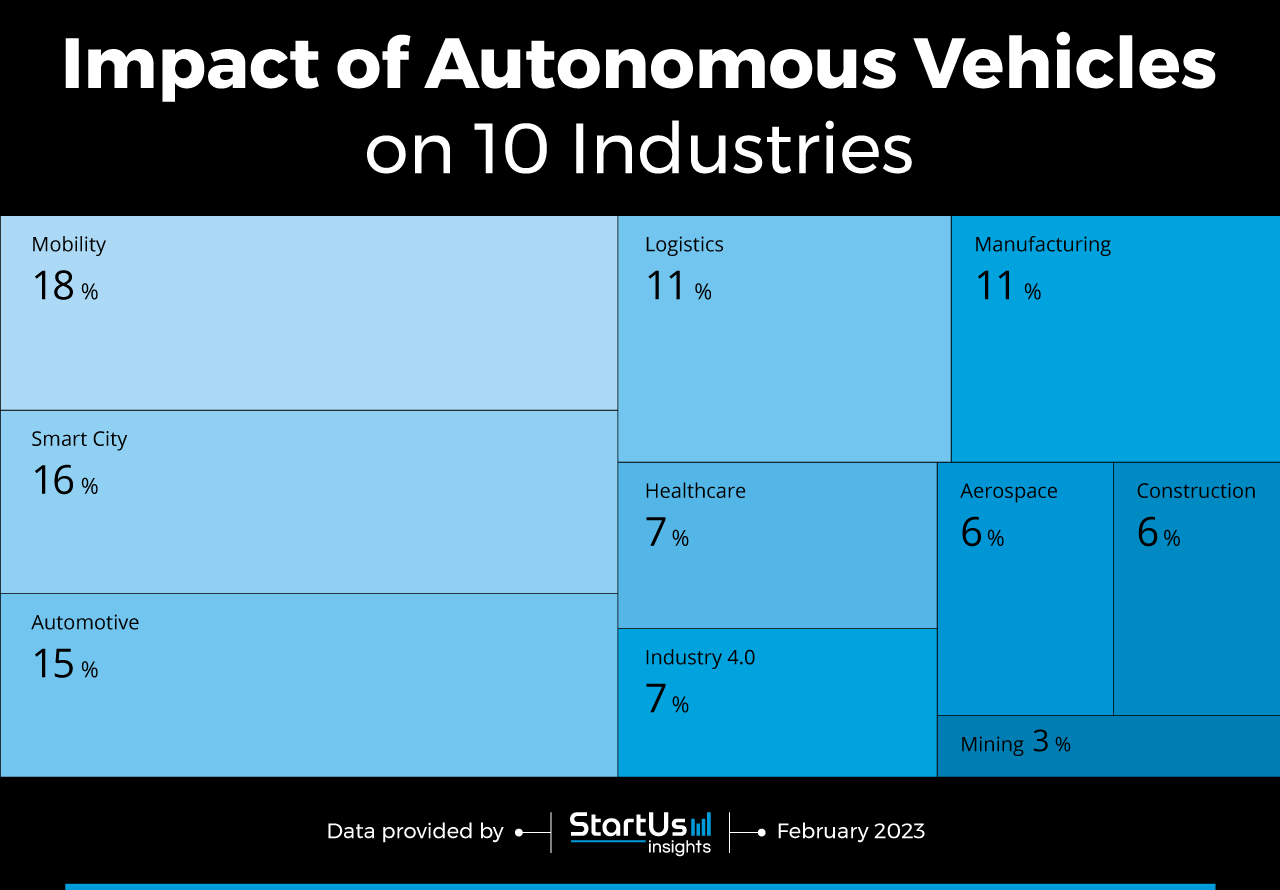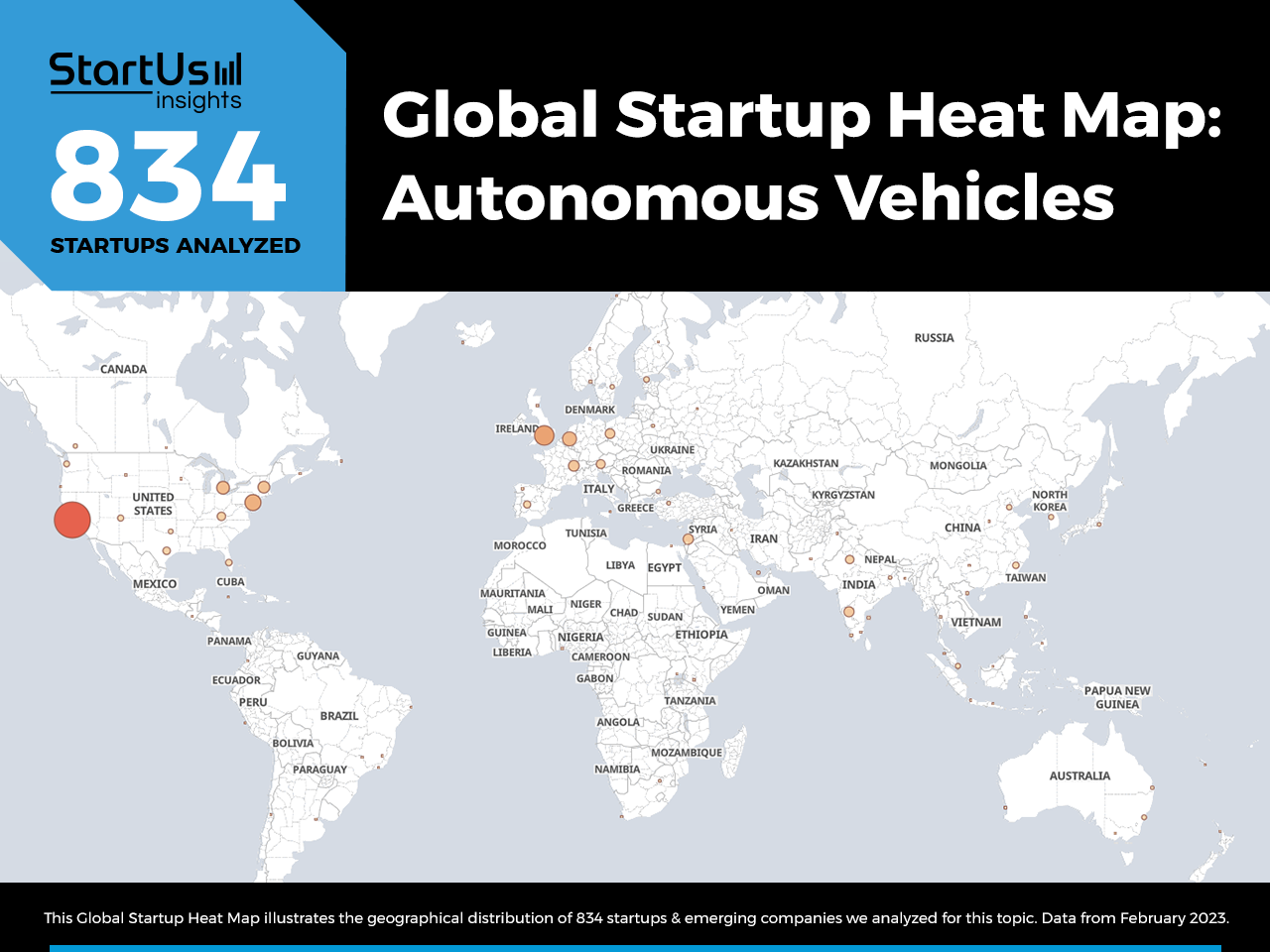Driver behavior constitutes a significant part of road accidents and reduces the efficiency of the global supply chain. That is why industries are leveraging autonomous vehicles to ensure better throughput. We give you data-driven insights into the applications of autonomous vehicles based on our analysis of 834 companies & technologies so that you do not miss out on emerging solutions to automate operations and improve efficiency. For example, autonomous long-haul trucks allow logistics companies to optimize first-mile and middle-mile deliveries. Read more to explore the impact of autonomous vehicles on 10 industries and how they advance your business.
Tree Map reveals the Applications of Autonomous Vehicles across 10 Industries
Based on the Innovation Map, the Tree Map below illustrates the top autonomous vehicle applications across 10 industries in 2023. As expected, the mobility and automotive industries see the most activity among autonomous vehicles startups. This is driven by both customer convenience and to increase on-road safety. Cities also leverage technology to automate various operations, from public transportation and last-mile delivery to waste logistics.
Further, logistics companies replace manual labor with autonomous driving systems to enhance supply chain efficiency, while the healthcare sector sees activity in autonomous ambulances and prescription delivery. Industries accommodating industry 4.0, especially the manufacturing sector, use autonomous vehicles to streamline intralogistics and material handling. At the same time, autonomous aircraft is gaining momentum for applications across industries like logistics and agriculture. Lastly, the construction and mining industries leverage autonomous machines to improve fleet management and efficiency.
Global Startup Heat Map covers 834 Autonomous Vehicles Startups & Scaleups
The Global Startup Heat Map below highlights the global distribution of the 834 exemplary startups & scaleups that we analyzed for this research. Created through the StartUs Insights Discovery Platform, the Heat Map reveals that the US has a high concentration of autonomous vehicle startups, followed by the UK.
Below, you get to meet 10 out of these 834 promising startups & scaleups as well as the solutions they develop. These autonomous vehicle startups are hand-picked based on criteria such as founding year, location, funding raised, and more. Depending on your specific needs, your top picks might look entirely different.
Interested to explore all 800+ autonomous vehicle startups & scaleups?
Top Autonomous Vehicle Use Cases across 10 Industries
1. Mobility
Autonomous driving systems eliminate the ambiguity in driving decisions and minimize road accidents. This and customer preferences are forcing more and more mobility companies to either retrofit existing vehicles or develop new autonomous cars and buses. Startups aid this by offering vehicles tailored for urban mobility.
They allow mobility companies to avoid capital-intensive in-house vehicle development and accelerate the time-to-market. As mobility companies reduce dependence on drivers, they are able to increase asset utilization rates and deliver a better customer experience, driving sales.
Faction Technology advances Autonomous Urban Mobility
Faction Technology is a US-based startup that builds DriveLink, an autonomous mobility platform. The startup’s electric vehicle (EV) is tailored for urban usage with a low footprint and production cost, making them ideal for micro-deliveries and on-demand urban mobility.
More importantly, DriveLink includes a safety feature that activates in the event of autonomous system failure. This capability allows mobility and transport companies to guarantee safety compliance and traveler safety as well as reduce road accidents and traffic congestion.
2. Smart City
Smart cities use autonomous vehicles to automate various aspects of city operations. These include public transportation, last-mile delivery, critical response, and waste logistics. Startups thus offer autonomous cars and trucks tailored for these purposes.
Consequently, they reduce traffic congestion and improve road safety. Additionally, they create massive amounts of operational data that enable real-time traffic flow control. This further enhances traffic monitoring, city planning, and security.
Ursa Robotics offers Autonomous Waste Collection Vehicles
UK-based startup Ursa Robotics makes autonomous waste collection vehicles. The startup replaces communal bins and garbage trucks with its automated containers. Once a container gets filled, another automated container replaces it.
Besides, autonomous vehicles move during periods convenient for the residents and city traffic. This allows municipal waste management facilities to automate, scale, and optimize waste logistics.
3. Automotive
There is a growing interest among customers for autonomous vehicles, especially after Tesla’s autonomous cars were a success. Therefore, all automotive manufacturers are integrating self-driving solutions to stay competitive. To aid this, startups offer plug-and-play solutions that readily integrate into production-ready vehicles and after-market installations.
This allows automotive manufacturers to mitigate in-house autonomous driving system development. Autonomous driving systems also enable vehicle manufacturers to optimize fuel consumption, reduce travel time, and lower vehicle emissions.
Sensible 4 makes All-Weather Autonomous Driving Software
Sensible 4 is a Finnish startup that develops DAWN, an autonomous driving software solution for all weather conditions. It uses sensor fusion to combine data from various sensors such as LiDAR and cameras. The software is modular and consists of four stacks for positioning, obstacle detection and tracking, planning, and control, as well as remote operations. Shuttle bus and truck manufacturers thus leverage DAWN to integrate Level-4 autonomy into their vehicles, mitigating in-house development and accelerating the time-to-market.
4. Logistics
Driver shortage and high fuel costs are the leading concerns among logistics companies. Autonomous vehicles enable the logistics industry to tackle these issues and automate supply chains. This sector primarily uses three types of autonomous vehicles – sidewalk vehicles, on-road delivery vans, and autonomous trucks, automating end-to-end operations.
In addition, autonomous delivery vehicles allow logistics companies to reduce operational and maintenance costs, increase lane capacity, as well as decrease traffic congestion and emissions.
StreetDrone manufactures an Autonomous Terminal Tractor
StreetDrone is a UK-based startup that makes StreetDrone Smart 1, an autonomous terminal tractor for logistics companies. It combines a proprietary drive-by-wire system and software to automate tractor navigation.
Additionally, StreetDrone Smart 1 features an electric propulsion system, 5G connectivity, and a teleoperation mode. The startup further develops Pix-E, an autonomous last-mile delivery vehicle. These vehicles enable logistics companies to reduce delivery delays, accidents, and emissions.
5. Manufacturing
The manufacturing sector leverages autonomous vehicles to automate material handling and last-mile operations. This reduces the dependence on manual labor while improving worker safety in industrial environments.
To facilitate this, startups develop solutions, such as autonomous forklifts and loaders, tailored for manufacturing lines, warehouses, and fulfillment centers. Other startups offer autonomous forklifts and loaders to optimize operations. They also enable manufacturers to address market demands, reducing supply chain disruption.
Gideon Brothers offers Shop Floor Automation
Gideon Brothers is a US-based startup that offers autonomous material handling solutions. The startup integrates a proprietary AI- and 3D vision-based module into its autonomous forklifts, Trey. The vision module visualizes, understands, localizes, and navigates the forklifts across indoor or outdoor environments.
Further, the cameras and built-in sensors provide data to the localization system that creates dense 3D environmental models and updates them in real-time. This allows the forklifts to operate safely alongside workers and equipment while automating material transport, lifting, feeding, and other collaborative movements.

6. Healthcare
The healthcare industry uses autonomous vehicles to deliver prescriptions and drugs to patients as well as improve medical care delivery. For example, the healthcare on wheels approach enables hospitals to offer mobile healthcare delivery for critical patients.
Autonomous vehicles further allow passengers to direct their vehicles automatically to hospitals for quicker emergency response. At the same time, these vehicles provide persons with disabilities with improved access to healthcare.
AyeAI provides an Autonomous Ambulance
AyeAI is an Indian startup that makes AyeAM, an autonomous ambulance. It combines the startup’s telepresence robot, Dr Rho, AI, augmented reality (AR), and remote clinical examination modules to treat patients.
This enables healthcare providers to deliver emergency and critical care services at inaccessible and unapproachable locations. Moreover, AyeAM allows hospitals to offer medical care in epidemic areas where human intervention is detrimental.
7. Industry 4.0
Autonomous vehicles play a significant role in advancing industry 4.0 and, hence, find applications across industries. For example, the agri sector utilizes autonomous tractors to automate land tilling and crop harvesting. Similarly, this technology enables industries to tackle labor shortages for logistics operations and address the growing market demands.
To aid this, startups develop autonomous driving solutions that utilize existing digital infrastructure like the Internet of Things (IoT) and operational technology (OT) systems. Consequently, they reduce the time and cost required to adopt autonomous vehicles and accelerate automation.
Helgen Technologies advances Industrial Process Automation
Helgen Technologies is an Irish startup that automates heavy machinery to automate industrial processes. The startup’s retrofit solution leverages existing IoT and is compatible with various machines.
Agri, mining, oil and gas, and waste management companies use it to reduce the risk of accidents and enhance operational efficiency. Besides, the solution collects relevant operational data to optimize process planning and control.
8. Aerospace
Autopilot and other automated control systems are already a part of commercial aviation. Startups and large companies now integrate fully autonomous navigation systems to develop pilotless aircraft. This improves the safety of long-distance air travel and enhances the use of aircraft for defense applications.
At the same time, many aircraft manufacturers are using autonomous navigation to automate air freight. These allow airlines to reduce flight risks and costs while ensuring customer satisfaction.
Pyka makes an Autonomous Agricultural Airplane
Pyka is a US-based startup that manufactures Pelican, a specialized autonomous electric airplane for complex agricultural operations. It utilizes LIDAR-enabled collision avoidance, aerial 3D terrain mapping, and dynamic path planning for navigation.
Pelican also features high payload capacity, precision, and drift reduction technologies to provide scalable and effective crop protection. This allows farmers to scale operations as it covers vast areas in short durations while reducing dependence on capital-intensive manual labor.
9. Construction
Operating construction machinery requires worker expertise and comes with significant safety concerns. Autonomous vehicles remove human labor from hazardous environments to optimize various operations like excavation and demolition. Additionally, startups automate dozers, load carriers, and haul trucks to optimize asset fleets of construction companies.
This increases fuel and operational efficiency while minimizing emissions. Combined with other systems such as AI or machine learning, autonomous vehicles provide visibility into operations and, in turn, enable data-driven planning.
SafeAI facilitates Construction Automation
US-based startup SafeAI retrofits existing equipment to automate construction operations. The startup’s solution, SafeAI Autonomous Platform, uses AI and task-specific autonomous vehicle technology to enable autonomous asset fleets.
SafeAI offers a device kit that converts heavy assets, such as heavy trucks, dozers, and loaders, into self-operating robots, thus increasing field efficiency without replacing existing equipment.
10. Mining
The mining industry sees activity in converting its heavy machinery into autonomous systems to improve production efficiency. Autonomous mining trucks enable continuous production and significantly reduce operational costs.
Since they eliminate driver fatigue and human errors from mining sites, autonomous vehicles improve mine safety. However, the high development costs of autonomous vehicles are hindering their adoption in the mining industry. That is why startups are developing low-cost retrofit solutions that integrate with existing machinery.
Repli5 offers 3D Mining Simulation Environments
Repli5 is a Swedish startup that creates 3D mining simulation environments for training autonomous systems. The startup’s proprietary platform, WorldGenerator, allows companies to create custom mining sites based on specific requirements or import scanned LiDAR data to create a digital twin.
The platform also enables companies to simulate road networks, import digital assets, and create deformations. This allows mining companies to mitigate costly data acquisition and accelerate model training for in-house autonomous systems.
Discover All Examples of Autonomous Vehicles Startups
Startups leverage AI, machine learning, robotics, advanced sensing, and computer vision to develop fully autonomous vehicles. Advances in 5G and advanced robotics will further improve the efficiency of autonomous systems and their adoption in the market. In addition, they play a massive role in improving worker safety in hazardous work environments and industrial settings. Get in touch to identify specific autonomous vehicle startups & solutions that advance your business!



![AI in Automotive: A Strategic Guide for Industry Leaders [2025-2030]](https://www.startus-insights.com/wp-content/uploads/2025/03/AI-in-Automotive-SharedImg-StartUs-Insights-noresize-420x236.webp)






